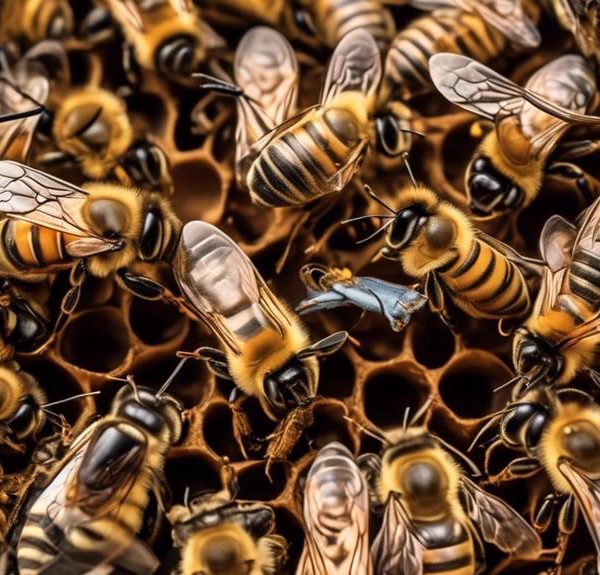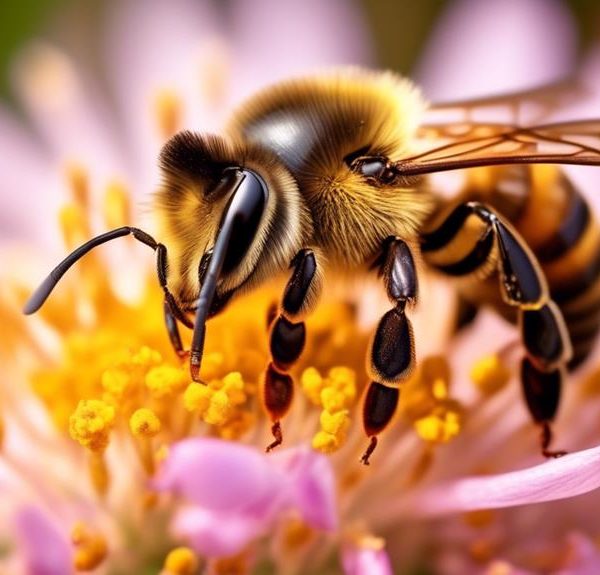Investigate the remarkable role bees play in our ecosystem, our food supply, and even our economy—let's uncover their buzzing importance.
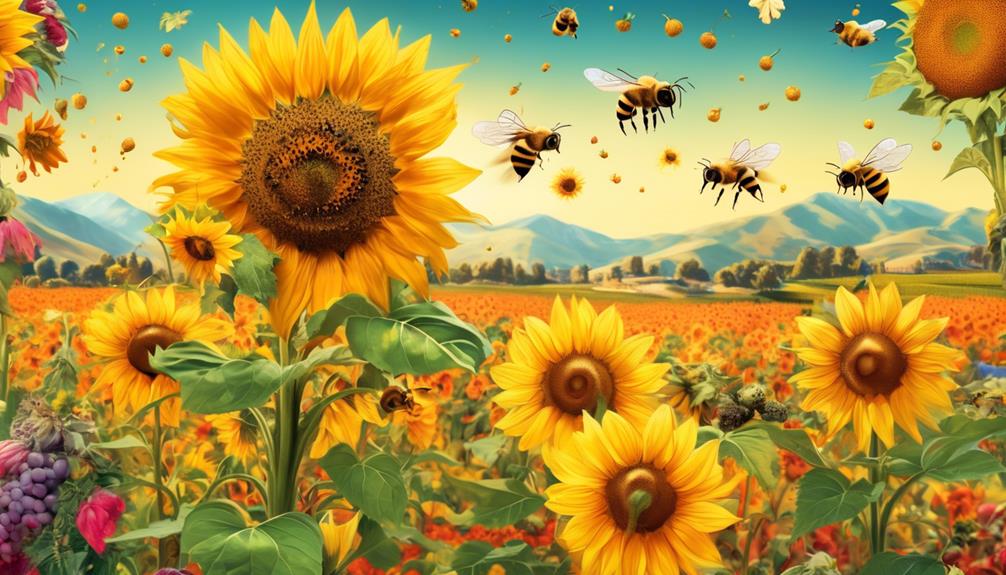
Why Are Bees Important to Humans?
Picture a world without the gentle hum of bees, buzzing from flower to flower in a dance as old as time. You might think they're just a minor nuisance at your summer picnics, but they're much more than that.
Bees, tiny as they are, play a monumental role in our lives and the environment we live in. From the food on our plates to the economy we're part of, these buzzing creatures have a hand in it all.
But why, you might ask? Well, let's dive into the fascinating world of bees and uncover their undeniable importance.
Key Takeaways
- Bees are crucial for pollination and food production, as they transfer pollen between flowers, enabling fertilization and the production of fruits and seeds.
- Bees contribute to honey production, which has numerous health benefits due to its antioxidant, antibacterial, and anti-inflammatory properties.
- Bees play a vital role in maintaining biodiversity by aiding in plant reproduction and genetic variation through cross-pollination.
- Bees have a significant economic impact, contributing billions of dollars to the global economy, creating jobs, and supporting industries such as agriculture and ecotourism.
Bees' Role in Pollination
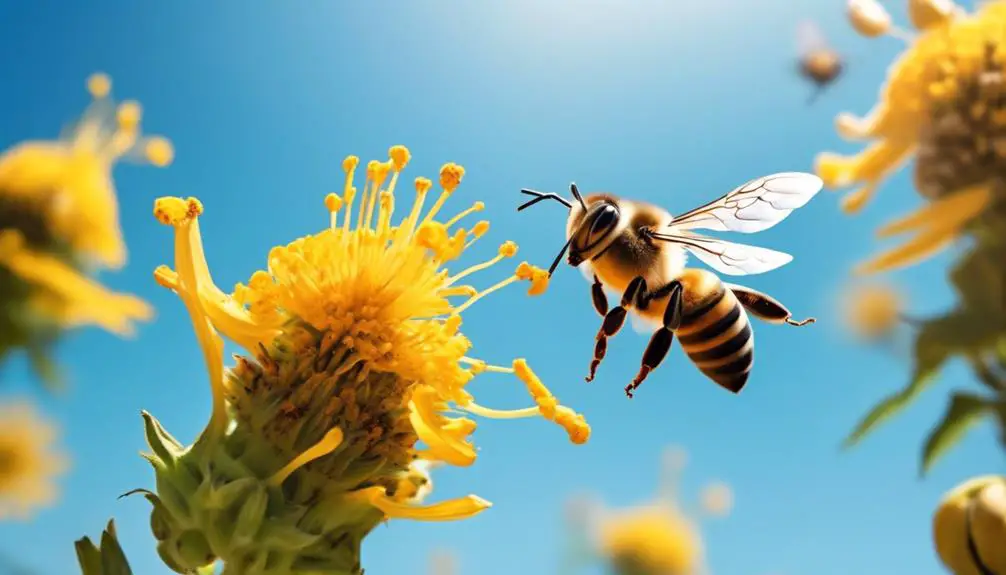
In the grand scheme of nature, you might be surprised to learn that bees play a pivotal role in pollination, acting as vital agents in the reproductive process of many plants, including a large portion of the crops we depend on for food. These industrious insects, with their distinctive stripy bodies and buzzing wings, transfer pollen from the male parts of a flower to the female parts, enabling fertilization and the production of fruits and seeds.
Bees' effectiveness as pollinators is remarkable. You see, they've evolved specialized body structures, like pollen baskets on their legs and hairs on their bodies, to collect and carry pollen efficiently. They also exhibit flower constancy, meaning they'll visit the same species of flower during a foraging trip, reducing cross-species pollen contamination.
Don't underestimate their contribution. They're responsible for pollinating around 70% of the world's most produced crop species. Without them, we wouldn't have a variety of fruits, vegetables, and nuts that we take for granted. Imagine a world without apples, almonds, or blueberries! Their decline could potentially disrupt ecosystems and our own food security. Hence, understanding and protecting bees is of paramount importance.
Honey Production and Health Benefits
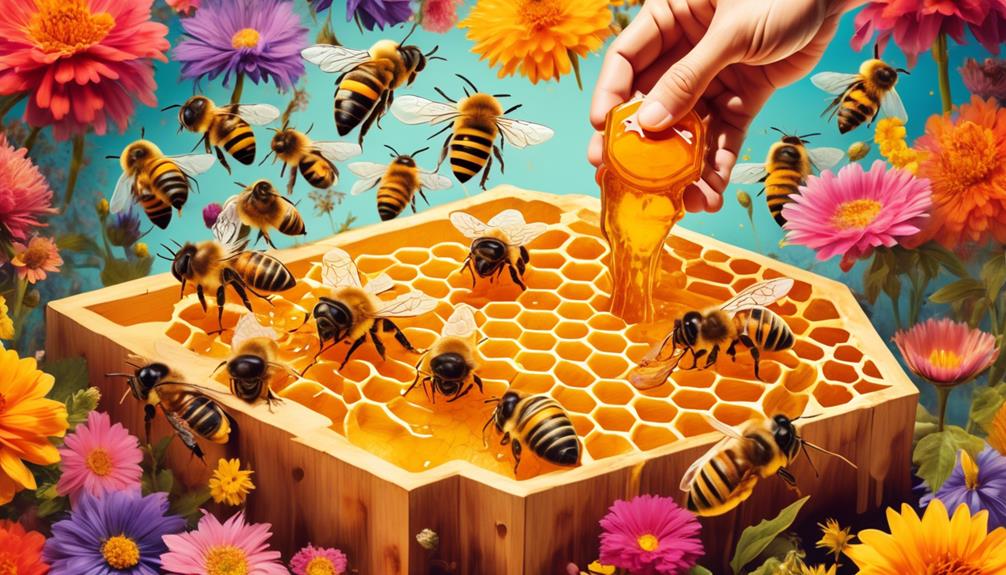
Beyond their crucial role in pollination, bees also contribute significantly to our lives through the production of honey, a natural substance packed with numerous health benefits. As a bee transforms nectar into honey, it introduces enzymes that break down complex sugars into simpler ones. This process, known as inversion, makes honey easily digestible.
The health benefits of honey are manifold. It's rich in phenolic compounds known for their strong antioxidant properties. Antioxidants play a critical role in protecting your body cells against damage caused by free radicals, which helps to prevent chronic diseases such as cancer. Honey also exhibits antibacterial and anti-inflammatory effects, making it an effective remedy for various skin conditions and infections.
Moreover, honey is a healthier alternative to refined sugar. It's a natural sweetener that doesn't spike your blood sugar levels as drastically. Honey's glycemic index is lower, meaning it's absorbed into the body gradually, resulting in a more stable energy supply.
Bees and Biodiversity
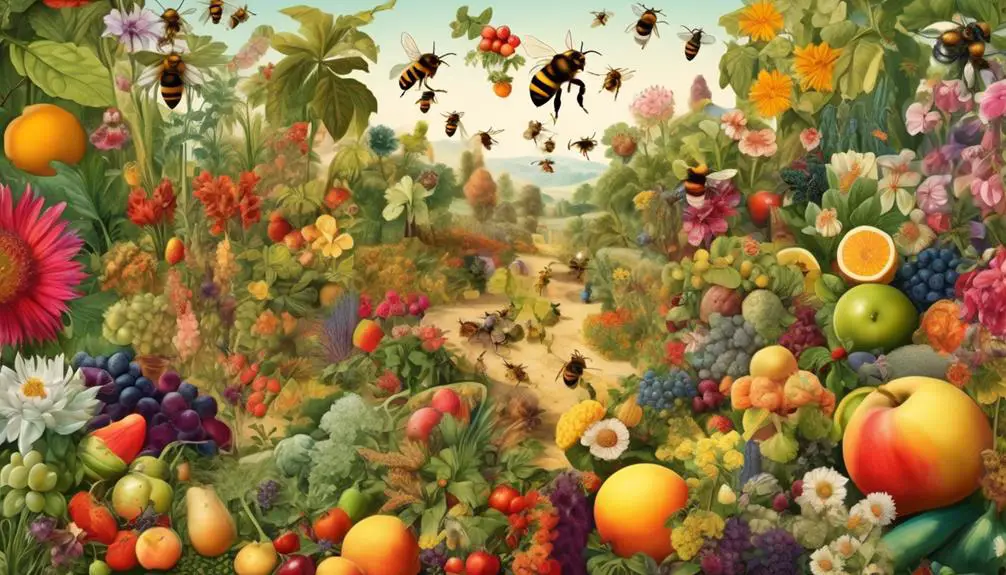
Turning our attention to biodiversity, you'll find that bees play a pivotal role in maintaining and enhancing the variety of life on our planet. They're key pollinators, fertilizing flowers by transferring pollen from the male parts to the female parts. This process, known as cross-pollination, aids plant reproduction and genetic variation, contributing significantly to the diversification of species.
Around 85% of all plant species are dependent on pollinators, and bees are among the most efficient. You'll see that without these industrious insects, many plants wouldn't reproduce successfully, leading to a decrease in plant biodiversity. This knock-on effect would impact entire ecosystems.
Furthermore, bees help sustain the food chains and webs that link species together. They support the growth of trees, flowers, and other plants, which serve as food and habitat for creatures large and small. You'll find that the decline in bee populations — a worrying trend in recent years — threatens biodiversity at all levels.
Economic Impact of Bees

While the ecological significance of bees is undeniable, let's not overlook their substantial contribution to our economy. Bees, in their role as pollinators, are fundamental for food production. As you sit down to enjoy your meals, remember that nearly one-third of our food is pollination-dependent.
From a financial perspective, the value of pollination services provided by bees is staggering. In the United States alone, honey bees contribute over $15 billion to the economy annually. Globally, this figure skyrockets to approximately $125-169 billion.
Yet, it's not just about the money. The economic impact of bees extends beyond just crop yields. Bees also contribute to job creation, particularly in agriculture and honey production industries. Furthermore, their pollination services help maintain biodiversity, which in turn supports ecotourism, another significant economic sector.
However, the alarming decline in bee populations threatens these economic benefits. Colony collapse disorder, habitat loss, and pesticide exposure are among the factors jeopardizing bee populations and, consequently, our economy. As such, it's crucial for us to take action to protect these industrious insects, recognizing that their survival is linked not only to our ecological well-being, but also to our economic prosperity.
Threats to Bee Populations
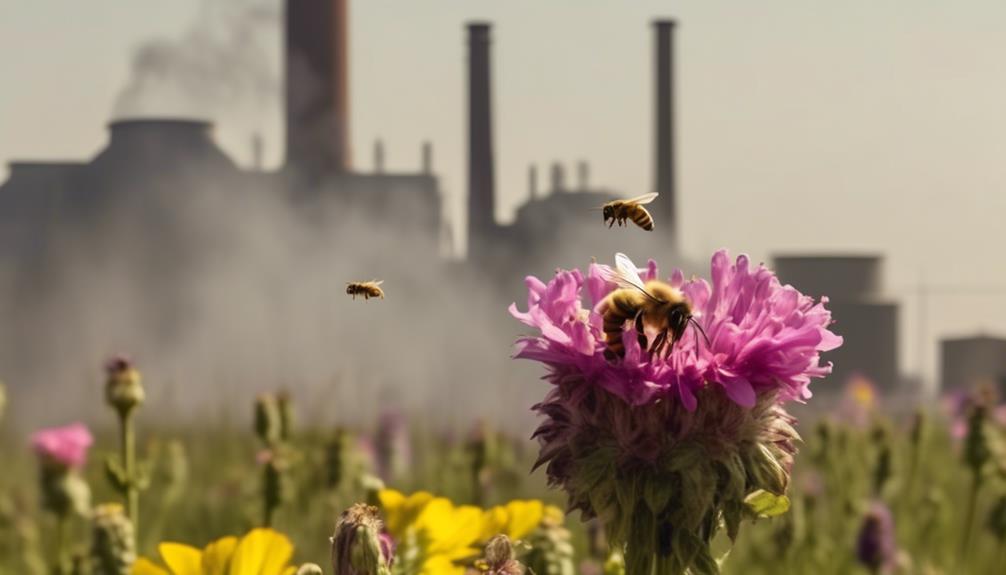
Alarmingly, bees around the globe face numerous threats that are precipitating their rapid decline and endangering the essential pollination services they provide. You'll find that these threats range from habitat loss and climate change to diseases, parasites, and the excessive use of pesticides in modern agriculture.
Human activities have significantly reduced natural habitats, forcing bees to adapt to new environments or perish. Similarly, our contribution to global warming has created erratic weather patterns and altered flowering times, disrupting the synchrony between bees and plants.
The threat doesn't end with environmental changes. Diseases like American foulbrood and parasites such as the Varroa mite pose a significant risk to bee colonies. They can wipe out entire populations, leaving vast areas devoid of these critical pollinators.
Pesticides, particularly neonicotinoids, are another hazard. You'd be surprised to know that these chemicals don't just kill pests; they're lethal to bees too. They impair bees' foraging ability, navigational skills, and reproductive success, leading to colony collapse.
Frequently Asked Questions
What Is the Lifespan of a Typical Bee?
You're asking about the lifespan of a typical bee. Worker bees, which are female, generally live for 5-6 weeks. Male drones, on the other hand, live around 8 weeks.
Yet, the queen bee defies these norms, living up to 5 years! Of course, lifespan can vary depending on factors like species, diet, and environmental conditions.
Now, isn't that a fascinating glimpse into the lives of these industrious little creatures?
How Do Bees Communicate With Each Other?
You might be surprised to learn that bees communicate using a 'waggle dance'. This unique form of communication allows a bee to inform others about the location of food sources. They'll wiggle their bodies and turn in specific patterns, essentially creating a map for other bees to follow.
Are There Any Cultural or Historical Significances Associated With Bees?
Certainly, bees hold significant cultural and historical value. You'll find them symbolizing various things in different cultures.
In ancient Egypt, they represented royalty and power. In Greek mythology, they're associated with the goddess Artemis, symbolizing purity.
Additionally, bees have been used historically in war, with apiaries utilized as defensive mechanisms.
You're exploring a rich tapestry of cultural contexts and historical implications when you delve into the world of bees.
What Types of Plants or Crops Do Bees Prefer?
You're curious about the types of plants bees prefer.
Bees aren't picky, they'll visit a variety of plants. However, they're particularly drawn to those producing abundant nectar and pollen, like sunflowers, lavender, and clover.
They also prefer flowers with bright colors, especially blue and yellow.
Keep in mind, bees' preferences can vary by species and location. They're incredibly adaptable creatures, able to find sustenance in diverse environments.
How Do Bees Navigate and Find Their Way Back to Their Hives?
Bees navigate using a method called path integration. They combine information about direction and distance from the sun to find their way back to the hive.
You'd be amazed to know they also use polarized light patterns, something we can't even see!
Additionally, they use landmarks and can even remember their routes.
Bees truly have a complex and efficient system for navigation.
Conclusion
You've seen it firsthand – bees play a crucial role in pollination, honey production, biodiversity, and our economy. Their health benefits are undeniable, yet they're facing dire threats.
Let's not forget, your daily life is intertwined with their survival. It's crucial to understand and respect their importance, for the sake of our future.
After all, a world without bees isn't just less sweet, it's less sustainable.

